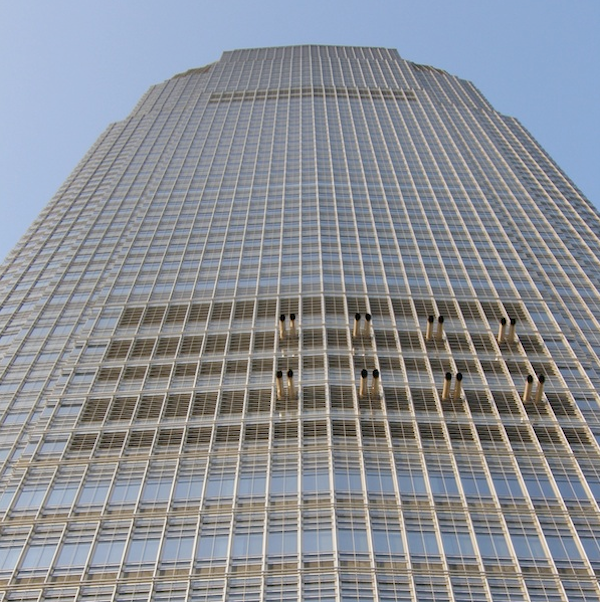Berkshire Hathaway To Be Top 10 Goldman Sachs Stakeholder, Warren Buffett One Step Closer To Owning The World


That Warren Buffett is one clever character. Don’t even act like he didn’t know exactly what he was doing back in 2008 when he made the deal with Goldman Sachs that’s now got the market buzzing with anticipation for his October exchange. In case you’ve been asleep that past couple of days, here’s the scoop:
Back in 2008, just days after Lehman Brothers collapsed, Goldman turned to long-time verbal supporter Buffett for some capital that would in turn rally confidence of its stock, which had already tumbled, in the market. Within two days of the announcement of Berkshire Hathaway’s $5 billion loan, Goldman Sachs raised $5.75 billion in stock offerings. Goldman repaid the loan, plus 10-percent interest, in 2011.
As it turns out, the deal also granted Berkshire warrants as a vote of confidence. Those warrants give Berkshire the right to purchase another $5 billion in common stock at $115 per share within the following five years. Since Goldman shares are now worth about $145, Berkshire stands to profit about $1.3 billion come Oct. 1, 2013. But always the clever one, Buffett’s struck up another deal.
Rather than spending $5 billion of its cash to purchase shares, Berkshire will receive Goldman shares equal to the total amount of profit, or $1.3 billion in Goldman stock. With that amount of holdings, Berkshire will own about 2 percent of the company and be one of Goldman’s 10 largest shareholders.
Like I said, that Buffett is one clever fellow. Watching him do business is like watching the prelude to some sci-fi novel where one single conglomerate owns the entire future. Is there anything that Berkshire Hathaway doesn’t own at least a piece of? It owns 100 percent of at least 40 companies, including Geico and seven other insurance companies, Dairy Queen, H.H. Brown Shoe Group, the Buffalo News and two other media companies, Helzberg Diamonds and two other jewelers, NetJets, Fruit of the Loom and four other clothing companies, six furniture companies and several construction companies. Berkshire Hathaway also owns 50 percent of H.J. Heinz Co., 13 percent of American Express, 23 percent of the Washington Post, almost 10 percent of Anheuser Busch, almost 9 percent of Coco-Cola, 6 percent of IBM, more than 4 percent of M&T Bank and almost 2 percent of Proctor & Gamble.
According to a recent annual report of Berkshire Hathaway, the company also holds outstanding stock in Bank of America, CarMax, ConocoPhilips, Costco, Gannett, Kraft Foods, Moody’s Corp., U.S. Bancorp., Wells Fargo and Even Wal-Mart. The list goes on and on.
Notice any possible conflicts? Damn. And that’s not a complete list. And it all happened before our very eyes, some longer than others, of course. Buffett started forming partnerships in the 1950s. By the early 60s he had at least seven and he merged them all into one, then invested into the textile manufacturing firm, Berkshire Hathaway. He eventually got out of the textile business and moved Berkshire into the insurance sector. He also started purchasing private companies. By the 1970s, Berkshire was purchasing large stakes in major corporations.
Not only does Berkshire own a little bit of everything—and gaining—but Buffett has enormous influence over the financial market. Buffett backs a stock, it’s sure to go up. There’s even an app for traders and wanna-bes that tracks Buffett’s every move. Buffett makes a remark about his secretary’s tax bill, legislators write a bill. And as Berkshire gets bigger and stronger, its acquisitions become easier and more frequent. Take the Goldman Sachs deal. Berkshire didn’t have to spend a dime. Buffett had the foresight five years ago—when all hell was breaking loose—to lend money to the firm he felt was the best gamble at the time. He got his money back, and now his firm is going to own a major stake with absolutely no capital investment.
Don’t get me wrong, I don’t think Buffett is some corrupt Dr. Evil hiding in his Omaha home, holding his pinky to his mouth, planning to take over the world while his mini-me runs rampant. Buffett has made wise choices his entire life, and is generally known as humble and the “billionaire next door.” But Buffett is also 82 years old. And it’s not completely clear who his successor will be. One would hope that Buffett, whose thoughts on just about everything are well known through the annual letters to shareholders he’s been writing since 1977, would have the same foresight in choosing his successor as he’s shown in his business decisions. But is it even possible to find another individual who can replicate Buffett’s wisdom? Or could the next guy take that power and use it to take over the world?









































